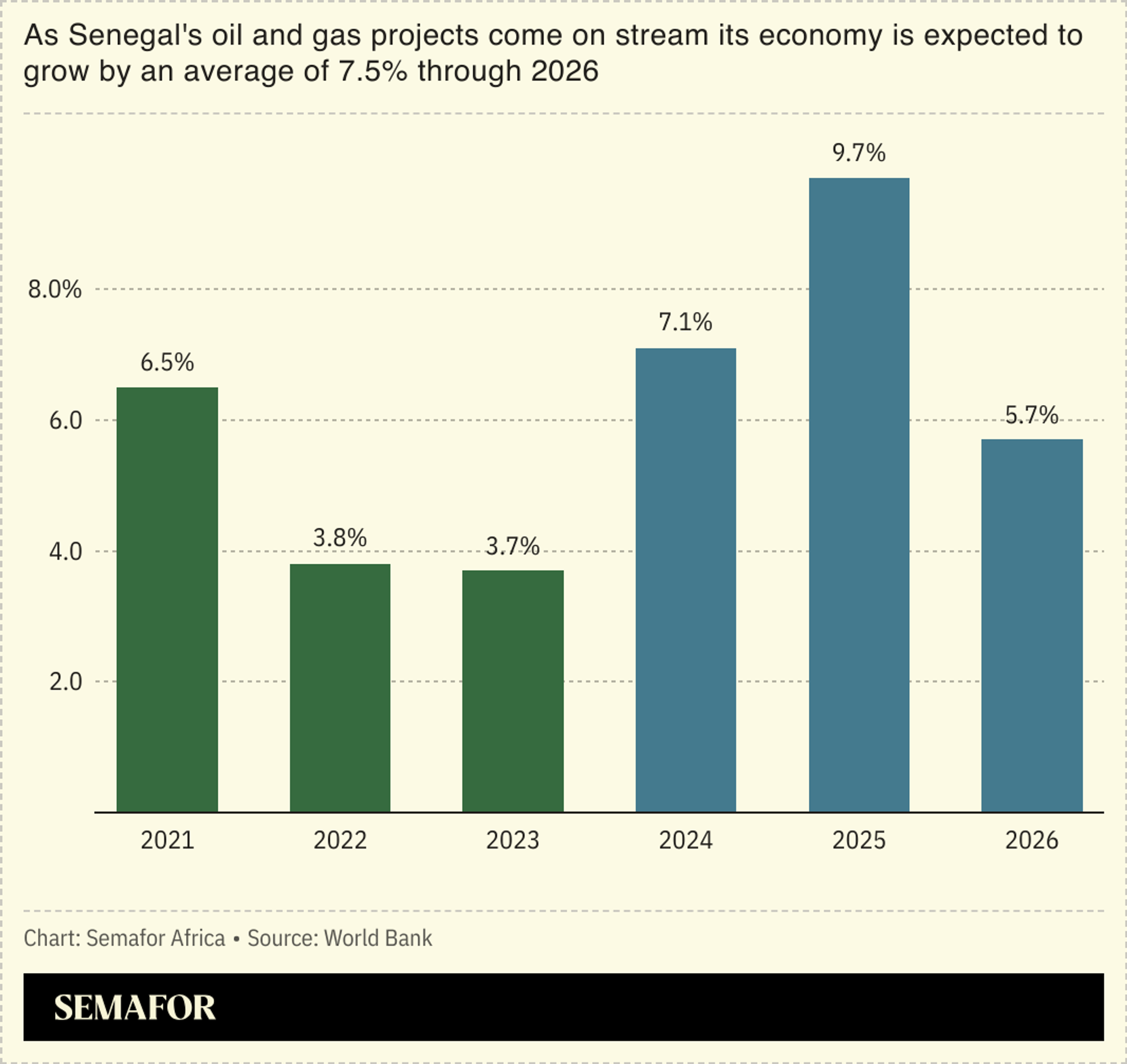The Scene
Bassirou Diomaye Faye’s first 100 days as Senegal’s president have been marked by a string of audits reviewing public finances and minerals contracts. But there have also been quick measures implemented to attract capital to the West African nation and to cushion the effects of rising living costs to sustain his early popular appeal.
The 44-year-old, who took office in April after a whirlwind couple of months that took him from a jail cell to the presidential palace, has implemented his plan for Senegal in a tone more measured than the revolutionary verve of his campaign. No contracts with multinationals have been canceled. His first foreign trip outside of Africa was to meet with French President Emmanuel Macron in Paris. Senegal remains a member of the euro-pegged CFA currency zone.
The mood in Senegal is that Faye is “taking time to take stock of state affairs, refine policy plans, and learn the ropes of governance,” says Jeanne Ramier, an Africa associate at the Eurasia Group consultancy. “The administration is still drafting the ‘Project’ document, which will replace [former president] Macky Sall’s Emerging Senegal Plan and has been slow to come up with and roll out concrete policies,” Ramier told Semafor Africa.
Key among Faye’s quick-win acts on the economy is the $750 million eurobond issued in June to meet government financing needs ahead of the start of oil and gas production this year. A week after the bond sale, the government slashed the prices of bread, oil and rice while suspending taxes and customs duties on importers. These are moves likely to buy Faye some time before having to make harder policy decisions that will entail disruptive reforms, Ramier said.
In this article:
Know More
Senegal’s economy grew by 4.3% in 2023, a larger rate than the year before, while inflation dropped by nearly 4 percentage points from a record high of 9.7% in 2022, according to the World Bank. The oil and gas projects coming on stream this year could grow Senegal’s economy by an average of 7.5% a year between 2024 and 2026.

Where external shocks like the COVID-19 pandemic and the Russia Ukraine war threw African countries like Ghana and Zambia into sovereign debt default, Senegal held steady “at moderate risk of public debt distress” and maintained its decade-long run of growth and stability.
Poverty is expected to decline slightly to 8.7% this year as a result of growth in the agriculture sector, the World Bank said in June.
Alexander’s view
Faye said he would “govern with humility” while accepting his victory in the March elections that, according to him, showed Senegal wanted a break with the past. If the intent to forge a new future has seen him commission a litany of audits of state agencies and processes, he has also appeared careful to not dismantle the pillars of what he inherited.
That said, Faye’s remaking of the presidency and its powers could be the indicator to watch as to how Senegal changes under his leadership. He has increased the responsibility of the prime minister, a role he gave to his firebrand political mentor Ousmane Sonko.
In contrast to his boss, Sonko has maintained some of the fiery themes of the campaign season. In May, for example, he questioned the impact of French military bases in Senegal on “national sovereignty and our strategic autonomy.” It raises the prospect that the country could follow in the footsteps of other French-speaking African nations who have ordered the former colonial power to withdraw its troops from their territories.
A key constraint on the Faye presidency so far has been the lack of a majority in parliament. The president has to wait until mid September, when it would be two years since the current crop of legislators took office, before possibly dissolving parliament and calling for new elections, according to Senegalese law. New elections would have to take place between 60 and 90 days after such a decree.
“I think the real test will come after the new legislature is installed,” Ramier said. She expects that Faye will earn a majority that will then enable the implementation of the “more controversial parts” of his agenda — from amending Senegal’s oil and gas code in order to increase state revenues, to overhauling the agriculture sector.
Notable
- West Africa’s economic and political bloc Ecowas chose Faye as its envoy to convince Mali, Burkina Faso, and Niger against their plan to leave the union, seeking to tap into the young president’s reputation and contacts.
